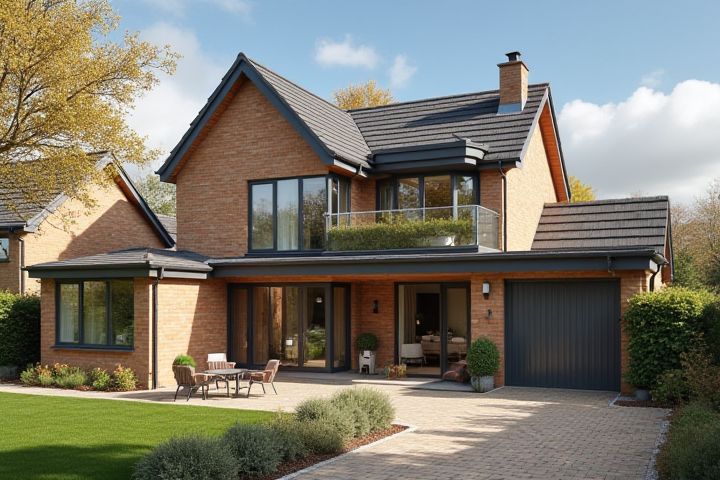
In many regions, you typically need a permit for house extensions to ensure compliance with local building codes and regulations. This process often involves submitting detailed plans that showcase the design, dimensions, and structural integrity of your proposed extension. You are responsible for checking your municipality's zoning laws, as they dictate aspects such as height restrictions and property line setbacks. Failure to obtain the necessary permits can result in fines and may require you to remove the extension entirely. Consulting with a licensed architect or contractor can help navigate the permitting process efficiently.
Do You Need A Permit For House Extensions
Local zoning regulations
Local zoning regulations often dictate the requirements for obtaining a permit for house extensions. These regulations vary by jurisdiction and can affect factors such as allowable building height, setbacks from property lines, and overall lot coverage. Before proceeding with a house extension, you should check with your local zoning office to determine if a permit is required, as non-compliance can lead to fines or required removal of the structure. Understanding these local regulations ensures that your renovation project adheres to community standards and avoids legal complications.
Building codes compliance
Obtaining a permit for house extensions is often necessary to ensure compliance with local building codes and regulations. These codes govern aspects such as structural integrity, safety, and energy efficiency, which are critical for any construction project. Before starting your extension, it's essential to consult your local building authority to understand specific requirements and necessary documentation. Failing to secure the proper permits can result in costly fines and may jeopardize the safety and legality of your home improvement project.
Historic district restrictions
When considering house extensions in a historic district, obtaining a permit is typically a requirement due to strict preservation regulations. These restrictions aim to maintain the architectural integrity and historic character of the area, often limiting design options and materials. Before you start planning your extension, it's crucial to review local zoning laws and historic preservation guidelines, which may dictate the application process. Engaging with your local historic preservation officer can provide essential insights and help ensure your project aligns with community standards.
Permit application process
In most jurisdictions, obtaining a permit for house extensions is essential to ensure compliance with local building codes and regulations. Typically, the permit application process involves submitting detailed plans, including architectural drawings and structural specifications, to your local government or building department. The timeframe for approval can vary, often taking anywhere from 2 to 8 weeks, depending on the complexity of the project and local regulations. Fees for permit applications can range from $200 to over $2,000, influenced by the size and scope of the extension, making it crucial to research your area's specific requirements beforehand.
Architect or contractor requirements
When considering house extensions, obtaining the necessary permits is crucial to ensure compliance with local building regulations. Architects typically guide you through this process, providing plans that align with zoning laws and safety standards. Contractors may also assist by applying for permits on your behalf, which can streamline the construction timeline. Failure to secure the required permissions can lead to costly fines and complications, so it's essential to consult with your architect or contractor early in the planning stages.
Safety inspections
Obtaining a permit for house extensions is essential to ensure compliance with local building codes and regulations, which prioritize safety inspections. These inspections assess structural integrity, fire safety, and adherence to zoning laws, ultimately protecting your investment. Failing to secure the proper permits can result in costly fines and complications during future sales or renovations. Always consult with your local building department to understand the specific permit requirements and inspection processes in your area.
Property boundary considerations
When planning a house extension, understanding property boundary considerations is crucial. If your extension encroaches on neighboring land, you may require a Party Wall Agreement, especially if you're within 3 meters of a shared boundary. It's essential to check local regulations, as many councils stipulate that extensions must remain at least 30 centimeters from the boundary to avoid disputes. Ensuring compliance with these regulations will help protect your investment and maintain good relations with neighbors.
Permit fees
Permit fees for house extensions vary significantly based on location and the size of the project. In many jurisdictions, fees can range from $100 to over $1,500, influenced by factors such as square footage and the complexity of the design. You should also consider potential additional costs, including impact fees or inspections, which can further increase the overall expenditure. It is essential to check your local regulations to determine the exact permit fees applicable to your house extension project.
Approval timelines
Obtaining a permit for house extensions is essential to ensure compliance with local building codes and regulations. Approval timelines can vary significantly based on jurisdiction, the complexity of the project, and the completeness of your application. Typically, homeowners may experience a waiting period ranging from a few weeks to several months before receiving permit approval. To expedite the process, make sure to provide all necessary documents and plans, as this can lead to a smoother and faster review by local authorities.
Environmental impact rules
In many regions, obtaining a permit for house extensions is essential to ensure compliance with Environmental Impact Assessments (EIA) and local zoning regulations. These regulations often mandate a thorough evaluation of how your extension will affect local wildlife, water drainage, and soil stability. For instance, in urban areas, the authorities may require that your plans incorporate green building materials or techniques to minimize ecological disturbance. Always check with your local planning department to understand specific permit requirements and any associated fees, which can range from $50 to several hundred dollars.
